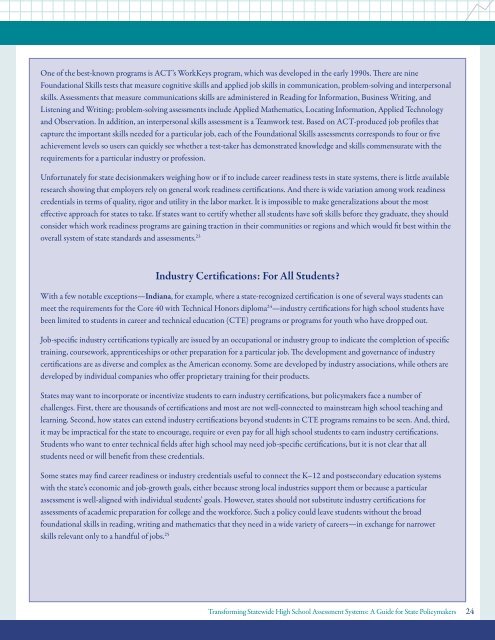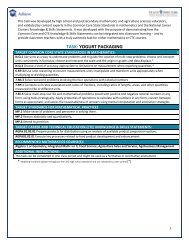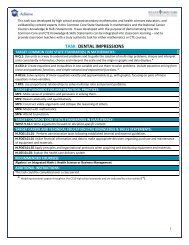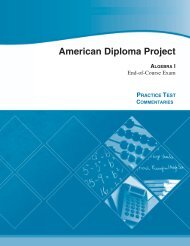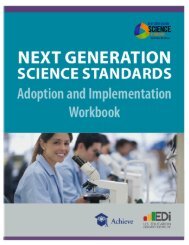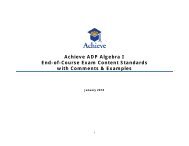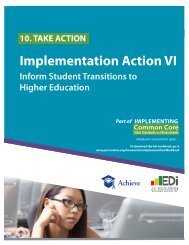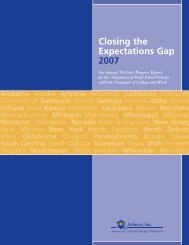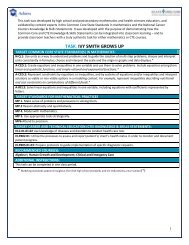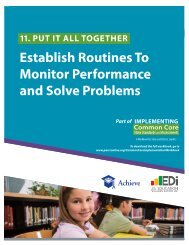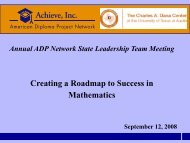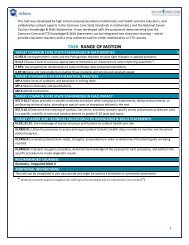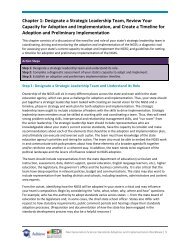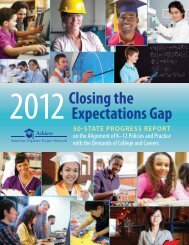Transforming Statewide High School Assessment Systems: - Achieve
Transforming Statewide High School Assessment Systems: - Achieve
Transforming Statewide High School Assessment Systems: - Achieve
Create successful ePaper yourself
Turn your PDF publications into a flip-book with our unique Google optimized e-Paper software.
One of the best-known programs is ACT’s WorkKeys program, which was developed in the early 1990s. There are nineFoundational Skills tests that measure cognitive skills and applied job skills in communication, problem-solving and interpersonalskills. <strong>Assessment</strong>s that measure communications skills are administered in Reading for Information, Business Writing, andListening and Writing; problem-solving assessments include Applied Mathematics, Locating Information, Applied Technologyand Observation. In addition, an interpersonal skills assessment is a Teamwork test. Based on ACT-produced job profiles thatcapture the important skills needed for a particular job, each of the Foundational Skills assessments corresponds to four or fiveachievement levels so users can quickly see whether a test-taker has demonstrated knowledge and skills commensurate with therequirements for a particular industry or profession.Unfortunately for state decisionmakers weighing how or if to include career readiness tests in state systems, there is little availableresearch showing that employers rely on general work readiness certifications. And there is wide variation among work readinesscredentials in terms of quality, rigor and utility in the labor market. It is impossible to make generalizations about the mosteffective approach for states to take. If states want to certify whether all students have soft skills before they graduate, they shouldconsider which work readiness programs are gaining traction in their communities or regions and which would fit best within theoverall system of state standards and assessments. 23Industry Certifications: For All Students?With a few notable exceptions—Indiana, for example, where a state-recognized certification is one of several ways students canmeet the requirements for the Core 40 with Technical Honors diploma 24 —industry certifications for high school students havebeen limited to students in career and technical education (CTE) programs or programs for youth who have dropped out.Job-specific industry certifications typically are issued by an occupational or industry group to indicate the completion of specifictraining, coursework, apprenticeships or other preparation for a particular job. The development and governance of industrycertifications are as diverse and complex as the American economy. Some are developed by industry associations, while others aredeveloped by individual companies who offer proprietary training for their products.States may want to incorporate or incentivize students to earn industry certifications, but policymakers face a number ofchallenges. First, there are thousands of certifications and most are not well-connected to mainstream high school teaching andlearning. Second, how states can extend industry certifications beyond students in CTE programs remains to be seen. And, third,it may be impractical for the state to encourage, require or even pay for all high school students to earn industry certifications.Students who want to enter technical fields after high school may need job-specific certifications, but it is not clear that allstudents need or will benefit from these credentials.Some states may find career readiness or industry credentials useful to connect the K–12 and postsecondary education systemswith the state’s economic and job-growth goals, either because strong local industries support them or because a particularassessment is well-aligned with individual students’ goals. However, states should not substitute industry certifications forassessments of academic preparation for college and the workforce. Such a policy could leave students without the broadfoundational skills in reading, writing and mathematics that they need in a wide variety of careers—in exchange for narrowerskills relevant only to a handful of jobs. 25<strong>Transforming</strong> <strong>Statewide</strong> <strong>High</strong> <strong>School</strong> <strong>Assessment</strong> <strong>Systems</strong>: A Guide for State Policymakers 24


